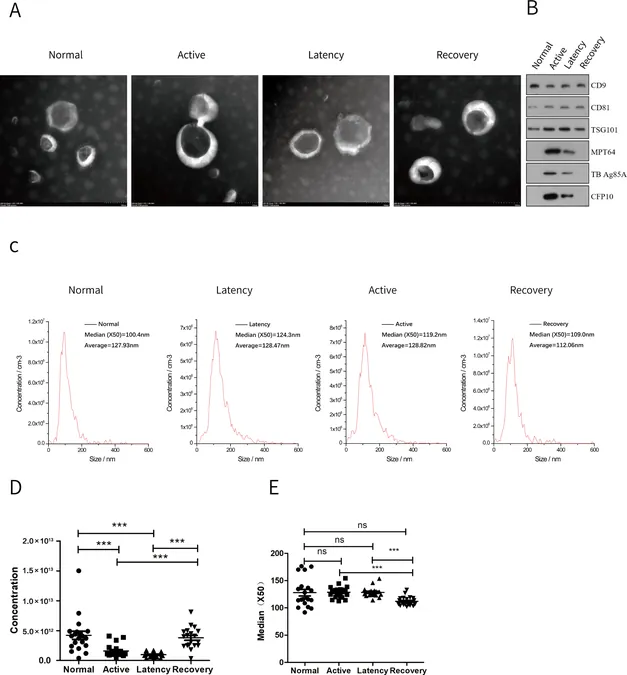
Revolutionary New Ways to Diagnose Tuberculosis: Could Plasma Exosome Antigens Be the Game-Changer?
2025-01-15
Author: Mei
Introduction:
Tuberculosis (TB) remains a global health crisis, with approximately 10.6 million new reported cases in 2021, according to the World Health Organization (WHO). Despite advancements in public health, TB continues to be the second deadliest infectious disease, right behind COVID-19. In a groundbreaking study, researchers have unveiled the potential of plasma exosome antigens as diagnostic biomarkers for tuberculosis, which could significantly change the way TB is detected and treated.
What Are Plasma Exosomes and Why Do They Matter?
Plasma exosomes are minute extracellular vesicles, measuring between 30 to 150 nm, secreted by cells and known to contain various types of molecules, including proteins, lipids, RNA, and metabolites. Research has shown that bacteria, including Mycobacterium tuberculosis (Mtb), can produce similar vesicles, which are thought to offer insights into the pathogen's characteristics.
This study specifically examined whether the concentration of Mtb antigens found within exosomes in blood plasma could serve as reliable diagnostic markers for different stages of TB infection, including active and latent forms.
Research Methodology:
The study included a cohort of 80 participants—20 with active TB, 20 with latent TB, 20 who had recovered, and 20 healthy individuals. Researchers isolated plasma exosomes via a series of centrifugations and assessed their quality and concentration using advanced techniques like nanoparticle tracking analysis (NTA) and electron microscopy. Key antigens related to Mtb—MPT64, Ag85A, and CFP-10—were quantified using enzyme-linked immunosorbent assay (ELISA).
Key Findings:
Results revealed strikingly higher levels of MPT64, Ag85A, and CFP-10 antigens in the plasma exosomes of active and latent TB patients as compared to healthy controls and those who had recovered. The study reported impressive area under the curve (AUC) values from receiver operating characteristic (ROC) analyses: - An AUC of 0.97 for MPT64 and 1.0 for Ag85A in active TB patients. - AUC values of 0.86 and 0.98 for MPT64 and Ag85A in latent TB respectively.
These results imply that these three Mtb antigens in plasma exosomes are not just mere indicators but potentially reliable diagnostic biomarkers, essential for early detection and treatment of TB.
Why This Matters:
Currently, TB diagnosis remains challenging due to limitations in sensitivity and specificity of traditional tests like sputum smear microscopy and culture-based methods. Rapid and reliable diagnostic tools, such as the proposed use of plasma exosomes, could revolutionize TB screening, especially in underdeveloped regions where TB remains endemic.
Expert Perspectives:
Experts believe that the identification of these biomarkers could lead to significant improvements in patient outcomes, enabling clinicians to make quicker and more accurate diagnoses, which is crucial for controlling the spread of the disease.
Future Directions:
While the study offers promising insights, it also acknowledges limitations including a relatively small sample size and concerns about the extraction process potentially increasing the risk of Mtb transmission. Future research should aim for larger, more diverse populations and explore the development of rapid tests that detect Mtb antigens without the lengthy exosome extraction process.
Conclusion:
The remarkable findings regarding plasma exosome antigens could pave the way for a new era in tuberculosis diagnostics. As researchers continue to unravel the complexities of TB, the potential for plasma exosomes to serve as commonplace diagnostic tools is both exciting and essential for the global fight against this looming health crisis. Could plasma exosome testing soon be integrated into standard TB screening protocols? Only time will tell, but the promise of early and accurate diagnosis awaits!
 Brasil (PT)
Brasil (PT)
 Canada (EN)
Canada (EN)
 Chile (ES)
Chile (ES)
 Česko (CS)
Česko (CS)
 대한민국 (KO)
대한민국 (KO)
 España (ES)
España (ES)
 France (FR)
France (FR)
 Hong Kong (EN)
Hong Kong (EN)
 Italia (IT)
Italia (IT)
 日本 (JA)
日本 (JA)
 Magyarország (HU)
Magyarország (HU)
 Norge (NO)
Norge (NO)
 Polska (PL)
Polska (PL)
 Schweiz (DE)
Schweiz (DE)
 Singapore (EN)
Singapore (EN)
 Sverige (SV)
Sverige (SV)
 Suomi (FI)
Suomi (FI)
 Türkiye (TR)
Türkiye (TR)
 الإمارات العربية المتحدة (AR)
الإمارات العربية المتحدة (AR)